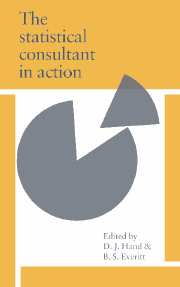Book contents
- Frontmatter
- Contents
- Preface
- List of contributors
- 1 Statistical consultancy
- 2 Consultants' cameos: a chapter of encounters
- 3 Straight consulting
- 4 A two-period crossover trial
- 5 Consultancy in a medical school, illustrated by a clinical trial for treatment of primary biliary cirrhosis
- 6 The analysis of response latencies
- 7 Acid rain and tree roots: an analysis of an experiment
- 8 On identifying yeasts and related problems
- 9 Uneven sex ratios in the light-brown apple moth: a problem in outlier allocation
- 10 Collaboration between university and industry
- 11 Inspection for faulty components before or after assembly of manufactured items
- 12 Statistical modelling of the EEC Labour Force Survey: a project history
- Bibliography on statistical consulting
- Name index
- Subject index
3 - Straight consulting
Published online by Cambridge University Press: 05 June 2012
- Frontmatter
- Contents
- Preface
- List of contributors
- 1 Statistical consultancy
- 2 Consultants' cameos: a chapter of encounters
- 3 Straight consulting
- 4 A two-period crossover trial
- 5 Consultancy in a medical school, illustrated by a clinical trial for treatment of primary biliary cirrhosis
- 6 The analysis of response latencies
- 7 Acid rain and tree roots: an analysis of an experiment
- 8 On identifying yeasts and related problems
- 9 Uneven sex ratios in the light-brown apple moth: a problem in outlier allocation
- 10 Collaboration between university and industry
- 11 Inspection for faulty components before or after assembly of manufactured items
- 12 Statistical modelling of the EEC Labour Force Survey: a project history
- Bibliography on statistical consulting
- Name index
- Subject index
Summary
The existence of a strong consulting interest in a university department of statistics (perhaps operating through the provision of a statistical advisory service to colleagues throughout the university) can provide vital lifeblood to that department. It enables the department to keep a high standard within its organisation, in demonstrating that staff are interested, committed and competent in helping others in applied disciplines with the inevitable statistical problems that they face. In return, it provides the statistics department with a most valuable source of material for teaching within a real-life context, for postgraduate students' projects, and indeed for the development of fundamental new research.
Apart from a willingness to undertake such advisory work the consultant statistician does need to have, or to develop, some rather special skills. Some aspects of this matter are discussed in Barnett (1986). I have talked elsewhere of the role of the consultant statistician as ‘Jack of all trades – master of one’ (Barnett, 1976) and this ubiquitous nature is very much a required characteristic. It is essential that the consulting statistician is able to immerse himself quickly, in an almost chameleon-like manner, in the intricacies of the client's special area (be it heart valves or horse teeth) and to offer the sympathetic communicating manner of the archetypal psychologist in drawing out his client and, at the end of the day, in handing back intelligible, and sometimes not necessarily welcome, conclusions.
- Type
- Chapter
- Information
- The Statistical Consultant in Action , pp. 26 - 41Publisher: Cambridge University PressPrint publication year: 1987
- 1
- Cited by



